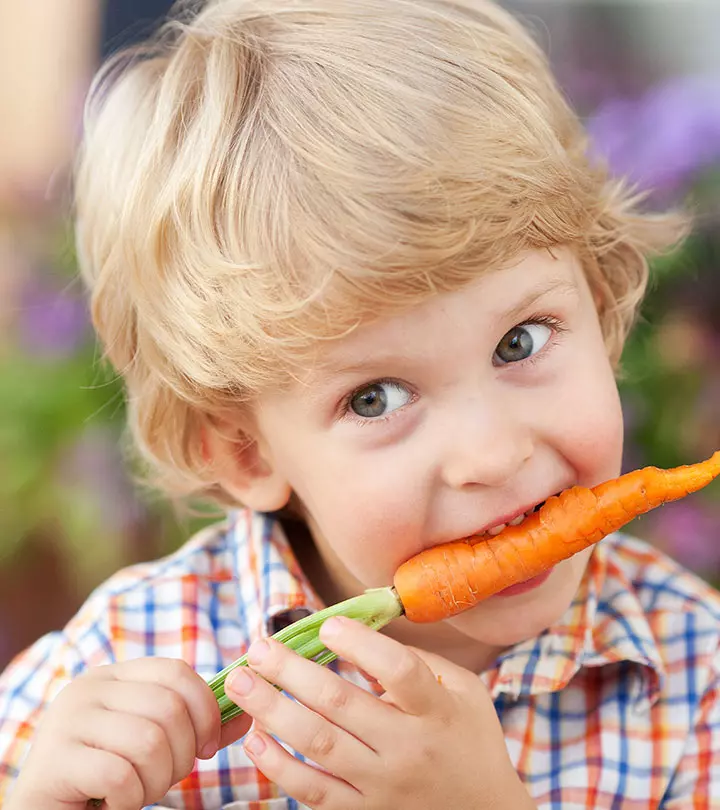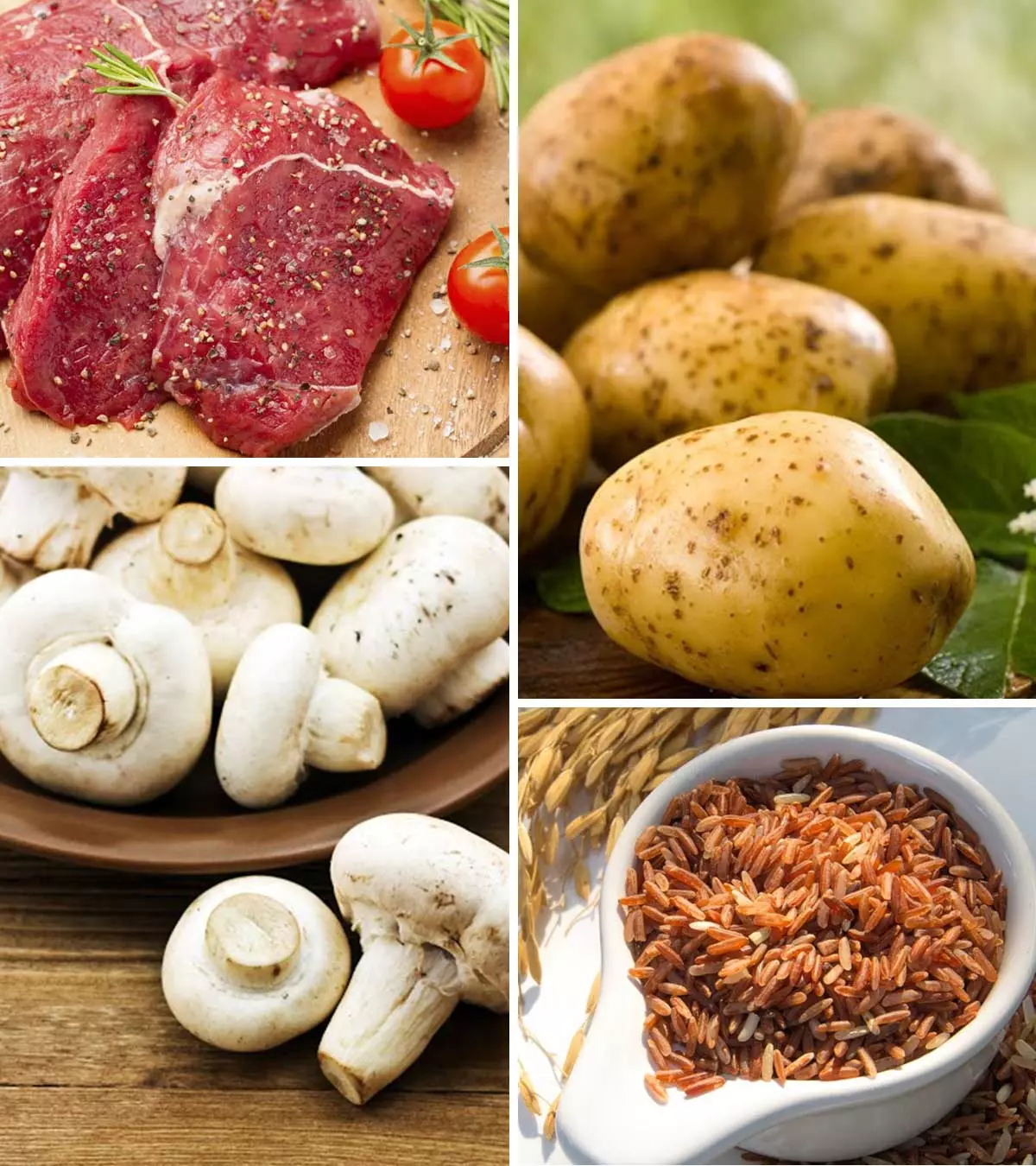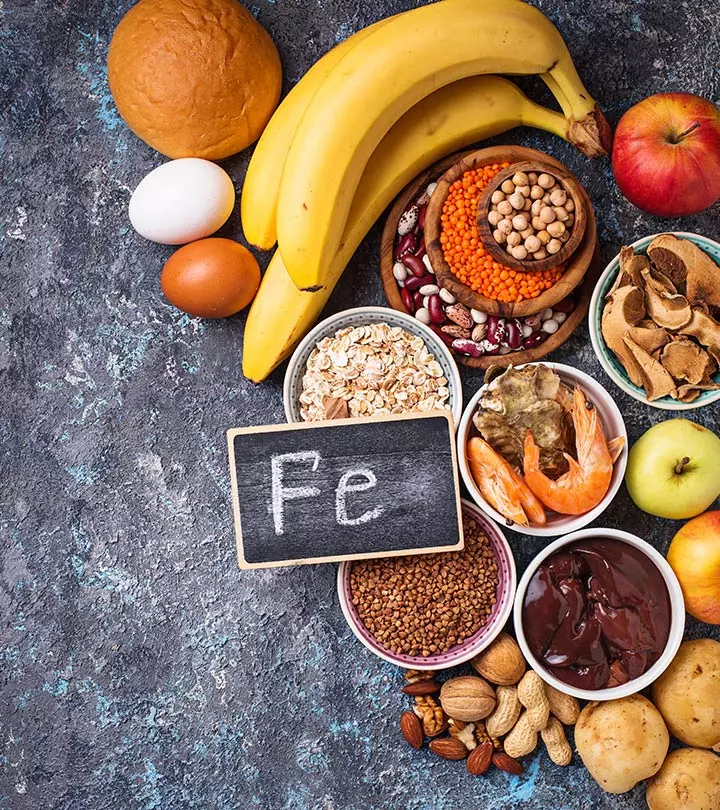
Image: Shutterstock
The benefits of cucumber for kids are diverse. Cucumbers are nutritious and fun for kids to eat, making them a perfect addition to any meal or snack. This popular summer vegetable is best known for its high water content, helping to prevent dehydration and cool down the stomach. Children can enjoy it raw as a part of fresh, crisp salads or a refreshing juice ideal for hot summers.

Cucumbers are also a rich source of antioxidants and vitamins that can improve your child’s immunity, protect them from different illnesses, and help manage minor burns or skin eruptions. Moreover, you can experiment with them in various ways to include them in your child’s diet.
Read on to know more about the health benefits of cucumbers for children and how to pick the best cucumbers when you go grocery shopping.
Key Pointers
- Antioxidants, vitamins, minerals, and essential nutrients are abundant in cucumbers.
- Cucumbers possess a high water content and can soothe the stomach.
- Their high vitamin content supports good eyesight, healthy hemoglobin levels, and bone metabolism.
- Cucumbers serve as natural painkillers, containing anticarcinogenic and analgesic properties.
- Additional benefits of cucumbers include preventing constipation, treating skin eruptions, promoting joint health, and strengthening hair and nails.
What Is A Cucumber?
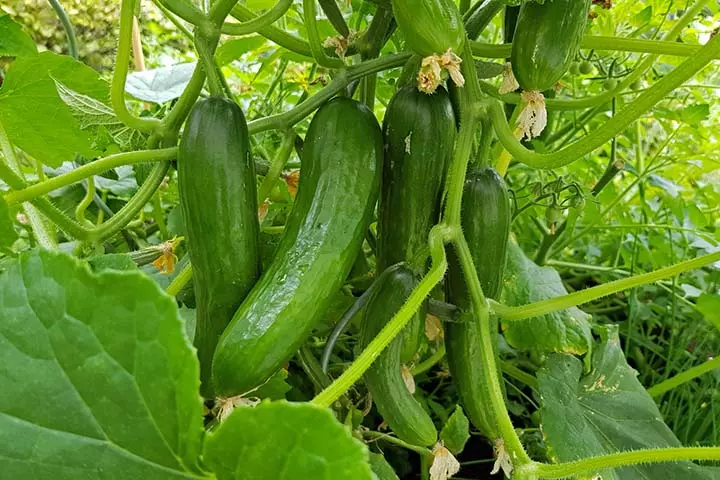
Cucumber is a torpedo-shaped vegetable with green or dark green skin outside and edible pulp with seeds inside it. It has a soft texture and a mildly sweet taste. This vegetable is quite popular and originates from South East Asia. However, today it is available in most parts of the world. Cucumber is rich in vitamins and antioxidants and has high water content. Many kids consume it during the summer.
Health Benefits Of Cucumber For Kids
1. Vitamin-rich
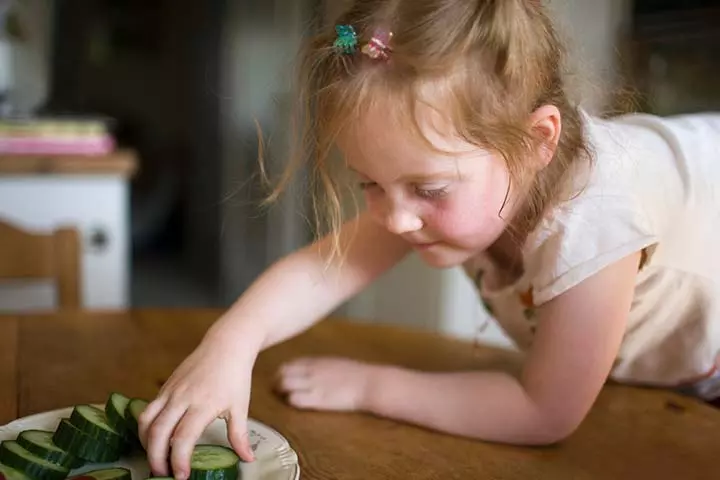
Cucumber possesses vitamins, such as Vitamin A, Vitamin B6, Vitamin C, Vitamin E, Vitamin K, thiamin, niacin, and folate. Vitamin A ensures good vision, vitamin B6 ensures a healthy hemoglobin count, and vitamin K helps promote bone metabolismiA vital process characterized by the continuous process of bone growth and degradation. and blood coagulationiA life-saving process that stops a person from bleeding out in case of an injury. in children. So eating cucumber or drinking its juice boosts your child’s immunity and keeps them healthy, energetic, and free of ailments. (1)
2. Prevents dehydration
Cucumbers possess a high amount of water. In fact, 96% of cucumbers is water. Munching a cucumber quenches your kid’s thirst as well as helps replenish the water and minerals in her body. Thus, eating cucumber prevents the risk of dehydration in kids.
 Quick tip
Quick tip3. Antioxidant-rich
Besides vitamins, cucumber is also a rich source of antioxidants. Free radicals resulting out of metabolism are in constant search of free electrons. These free radicals may attack electrons from essential body cells and, at times the DNA, thus causing serious ailments. Antioxidants possess free electrons, and they donate them to a free radical to neutralize it. So eating cucumber prevents free radical scavenging and protects your child from various disorders and ailments (2).
4. Aids weight-loss
Cucumber is a low-calorie vegetable. 100 grams of cucumber contains only 15.5 calories (3). Besides, they are rich in both soluble and insoluble dietary fiber, which as a part of a well-balanced diet, can help promote satiety and regulate overall food intake. All of which can help combat unwanted weight gain in children (4).
5. Treats stomach disorders
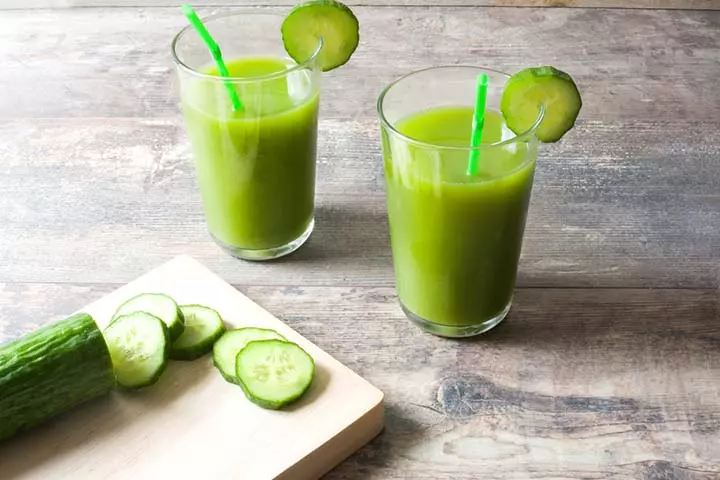
Cucumber is a great remedy to treat stomach disorders, such as acidity and duodenal and gastric stomach ulcers in children. Offer your kid cucumber juice to treat stomach disorders quickly and effectively.
6. Natural analgesic
Various studies reveal that cucumber possesses analgesic properties and acts as a natural painkiller. Flavonoids in cucumber provide analgesic effects. So, eating cucumber helps alleviate any pain your kid may suffer.
7. Treats skin eruptions or burns
Cucumber is a natural cure for skin eruptions in kids. A skin eruption, bug bite, or small burn can leave an ugly mark on the skin. Cucumber not only helps eliminate the mark but placing cucumber slices on skin eruptions for a few hours helps mitigate the pain and intensity of these eruptions.
8. Prevents constipation
Dietary fibers and high water content in cucumber promotes digestion. Eating cucumber aids in flushing out toxins from your kid’s body and prevents any constipation risks she faces. (5)
 Quick tip
Quick tip9. Lowers blood pressure
Cucumbers are rich in magnesium, potassium, and dietary fiber, which are vital in regulating blood pressure. Some studies show that regular intake of cucumber juice may help lower blood pressure levels. Thus, incorporating cucumbers into your child’s well-balanced diet could be an effective way to maintain their cardiovascular health in the long run.
11. Healthy hair and nails

Cucumber contains the mineral silica, which is beneficial for hair and nails. Eating cucumber helps keep your little one’s hair and nails strong and shiny.
11. Anti-carcinogenic
Cucumber possesses lignans, namely pinoresinol, secoisolariciresinol, and lariciresinol, which have great potential in preventing any cancer risks. Adequate and regular intake of cucumber prevents the chances of cancer development in children (6).
12. Promotes joint health
Cucumber is an excellent nutrition source of not only vitamins but also calcium, potassium, silica, and magnesium. So it effectively strengthens the connective tissuesiTissue that supports, protects and connects the body's organs. and promotes joint health in kids. Also, cucumber reduces uric acidiA chemical that is created when the body breaks down purines (building blocks of DNA). levels and prevents the formation of kidney stones (5).
 Quick fact
Quick factHow Do You Choose Cucumber For Kids?

Learning to choose cucumbers is essential to find those with the best quality and flavor. Pick those that have no cuts, soft spots, wrinkles, and bruises. Look for firm and heavy cucumbers for their size, indicating freshness and high water content. Additionally, organic cucumbers should be considered to minimize pesticide exposure. Peel the skin of the cucumber for better results. Let your kid munch a raw cucumber if she enjoys it. If your child doesn’t like the taste of raw cucumber, you can use simple ingredients to modify the taste of cucumber. An anonymous mother of two shares how she prepares Dill Cucumber Stars, a simple and fun cucumber snack. She says, “Ro and Ree (her daughters) are mad for cukes (cucumbers), and they’re mad for cooking, so this simple little recipe for dill cucumber stars is right up their alley. These work great in little bento boxes, as a side to any meal, or as an anytime snack (i).”
To make dill cucumber stars, cut cucumbers into fun shapes. Place the cucumber slices in a glass bowl and add white vinegar, water, sugar, salt, pepper, and minced dill. Refrigerate until chilled, then serve.
Whether raw or in delicious recipes, cucumbers can be a healthy and tasty addition to your child’s diet. If your kid doesn’t enjoy munching on cucumbers, you can also obtain fresh cucumber juice and give her a glass of juice daily.
Frequently Asked Questions
1. How do you serve cucumbers for kids?
You may serve your child sliced pieces of raw cucumber with or without the skin. In either case, ensure to clean the cucumber thoroughly before serving. Based on your child’s age and feeding abilities, you can cut a cucumber into cubes, circles, or lengthwise pieces and serve them as a part of salads, smoothies, dips, or an ingredient in infused water. Cucumber pickle is another way children can consume this hydrating vegetable.
2. Can kids eat too many cucumbers?
Cucumbers are high in water and fiber. It helps to bring satiety which may reduce the chances of overconsumption. However, cucumber may contain some antinutrientsiSubstances that block the absorption of nutrients from the food they consume. that interfere with the absorption of some minerals. Hence kids should not eat too many cucumbers (8).
3. Do cucumbers cause gas?
Cucumbers contain a compound called cucurbitacins, which may cause gastrointestinal problems. Thus, overconsumption of cucumbers can lead to gas and discomfort in some individuals (9).
Cucumbers contain a lot of water and are an ideal cooling food to beat the heat during summers, making it an essential ingredient in summer recipes for kids. Juicy cucumber for kids can prevent dehydration and provide relief from stomach disorders, constipation, and minor skin eruptions. They are found to keep joints healthy, act as a natural painkiller, and improve hair and nails. You can try out various recipes using this versatile vegetable. They are rich in vitamins and have antioxidant and anticancer properties too. You can give your child to enjoy it as is or add the chopped-up pieces into salads and vegetable snacks for kids in their lunchboxes or as juice.
Infographic: Easy And Tasty Cucumber Dishes Children Will Love
If your child doesn’t like cucumbers, the dishes shared in the following infographic will change their mind. These options are also ideal for children who don’t relish vegetables in general. Give them a try. Your child will surely ask for more.
Some thing wrong with infographic shortcode. please verify shortcode syntax
Illustration: Brilliant Health Benefits Of Cucumber For Kids
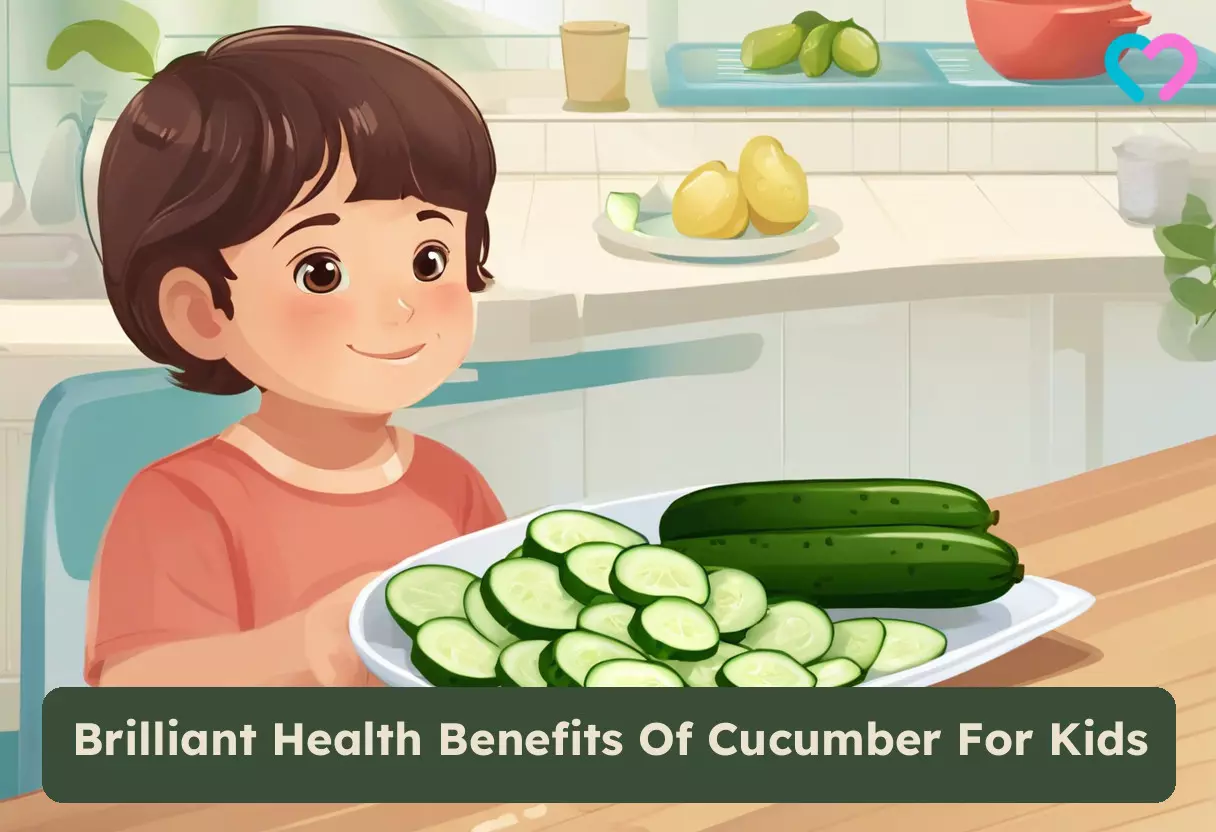
Image: Stable Diffusion/MomJunction Design Team
Personal Experience: Source
MomJunction articles include first-hand experiences to provide you with better insights through real-life narratives. Here are the sources of personal accounts referenced in this article.
i. Do your kids like cucumbers?https://salsainchina.blogspot.com/2009/04/do-your-kids-like-cucumbers.html
References
- Dr. Parveen Akhtar et al.; (2025); Energizing Effectiveness of Cucumber (Khayarain) For Health. A Review Article.
https://www.jetir.org/papers/JETIR2011118.pdf - D Kumar et al.; (2010); Free Radical Scavenging and Analgesic Activities of Cucumis sativus L. Fruit Extract.
https://www.ncbi.nlm.nih.gov/pmc/articles/PMC3019374/ - Shampa Chakraborty and Sadhana Rayalu; (2025); Health Beneficial Effects of Cucumber; Cucumber Economic Values and Its Cultivation and Breeding.
https://www.google.co.in/books/edition/Cucumber_Economic_Values_and_Its_Cultiva/y7ZaEAAAQBAJ?q=cucumber+for+weight+loss&gbpv=1#f=false - Chidiebere Ugwu and Stephen Suru; (2025); Cosmetic Culinary and Therapeutic Uses of Cucumber; Cucumber Economic Values and Its Cultivation and Breeding.
https://www.google.co.in/books/edition/_/y7ZaEAAAQBAJ?hl=en&gbpv=1 - Fiber.
https://hsph.harvard.edu/department/nutrition/ - Cucumbers.
https://www.chhs.colostate.edu/fsi/food-articles/produce/cucumbers/ - Health benefits of cucumber.
https://www.hampton.gov/DocumentCenter/View/1586/january_2013_newsletter?bidId= - Ayeni G et al. (2016); Anti-Nutritional Potential Mineral Elements And Phyto-Constituents Of Cucumber Fruits (Cucumis sativus).
https://www.researchgate.net/publication/322992996_ANTI-NUTRITIONAL_POTENTIAL_MINERAL_ELEMENTS_AND_PHYTO CONSTITUENTS_OF_CUCUMBER_FRUITS_Cucumis_sativus - Ujjwal Kaushik et al.; (2015); Cucurbitacins – An insight into medicinal leads from nature.
https://www.ncbi.nlm.nih.gov/pmc/articles/PMC4441156/ - Choose Water for Healthy Hydration.
https://www.healthychildren.org/English/healthy-living/nutrition/Pages/Choose-Water-for-Healthy-Hydration.aspx - 9 Health Benefits of Cucumbers.
https://organicconsumers.org/9-health-benefits-cucumbers/
Community Experiences
Join the conversation and become a part of our nurturing community! Share your stories, experiences, and insights to connect with fellow parents.
Read full bio of Dr. Sonal Dhemla
Read full bio of Sagari Gongala
Read full bio of Swati Patwal
Read full bio of Shinta Liz Sunny





